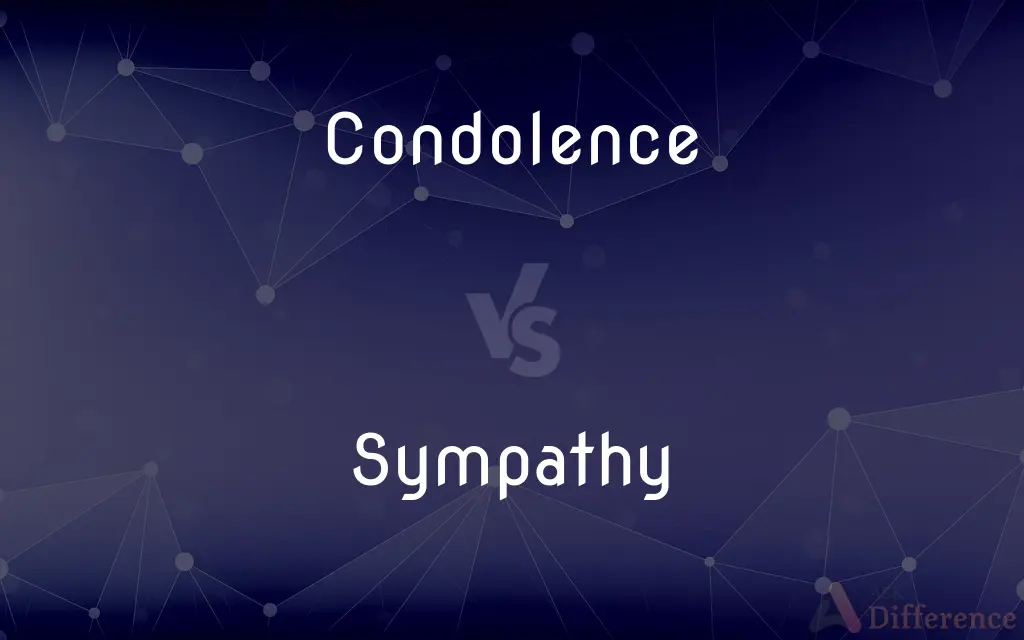Condolence vs. Sympathy — What's the Difference?
By Tayyaba Rehman — Updated on November 5, 2023
Condolence is an expression of sympathy, especially on the occasion of a death. Sympathy is the emotional response characterized by feelings of pity or sorrow for another person's misfortune.

Difference Between Condolence and Sympathy
Table of Contents
ADVERTISEMENT
Key Differences
Condolence and sympathy are two words that are related to expressions of sorrow and support, yet they serve different purposes in emotional exchanges. Condolence specifically refers to an expression of sympathy, particularly in response to the death of someone. It often takes the form of a message or gesture to the bereaved, signifying support and comfort during their time of loss. On the other hand, sympathy is a broader term that refers to the feeling of care and sorrow for someone else's misfortune or suffering. It involves the understanding or entering into the feelings of another, whether due to loss, misfortune, or pain.
Sympathy can be felt and expressed in various situations, not exclusively tied to the event of death, such as illness, loss of employment, or any difficult situation. It is a more general sense of shared emotion. Condolences, however, are typically reserved for expressing sympathy specifically in the event of death, and they often follow recognized social customs, such as sending flowers or cards. Sympathy can be felt without any outward expression, whereas condolences are often expressed through specific actions or words.
The act of offering condolences usually involves a communal aspect; it's an expression of sorrow meant to comfort others, often in a formal or semi-formal way. Sympathy, while it can be shared with others, is inherently a more personal, emotional response that one may not express outwardly. Condolences tend to be offered, while sympathy is something that is felt. A person might say "Please accept my condolences," at a funeral, but they might feel sympathy for a friend's setback without saying anything.
In terms of emotional depth, condolences might not necessarily require the person to actually feel the emotions of sorrow deeply; they might simply be a social obligation or courtesy. Sympathy, however, implies a deeper emotional connection and a shared feeling of sadness with the person who is suffering. While condolences are expressed, sympathy is both felt and expressed, and the expression of sympathy doesn't always follow the form of condolences. For example, one might feel and express sympathy by simply being present or listening to a friend in distress.
Lastly, both condolences and sympathy are important aspects of human interaction and social support systems. They are both ways in which people connect over shared experiences of loss and hardship. Condolences act as a formal acknowledgment of someone's loss, while sympathy is the emotion that often prompts the act of offering condolences.
ADVERTISEMENT
Comparison Chart
Definition
An expression of comfort during a time of loss.
The feeling or expression of pity for misfortune.
Context
Usually given during events of death.
Applicable in various situations of suffering.
Form
Often formal and structured.
Can be informal and personal.
Expression
Through specific gestures or messages.
Through shared emotions, sometimes non-verbal.
Emotional Depth
May not require deep emotional feeling.
Involves sharing in someone’s emotional state.
Compare with Definitions
Condolence
A message conveying sympathy with someone in grief.
She received many cards expressing condolences from friends and relatives.
Sympathy
Feelings of pity or sorrow for someone else's misfortune.
She felt a great deal of sympathy for the families affected by the disaster.
Condolence
An expression of comfort to someone who has experienced a loss.
They offered their deepest condolences to the family of the deceased.
Sympathy
Understanding between people; common feeling.
There was an immediate sympathy between the two strangers.
Condolence
A formal expression of sorrow for someone's death.
The president sent a letter of condolence to the victim's family.
Sympathy
Support in the form of shared feelings or opinions.
His sympathy for the cause compelled him to volunteer at the event.
Condolence
Sympathy with the sadness of another, especially in the event of death.
He expressed his condolence with a heartfelt eulogy.
Sympathy
Agreement with or approval of an opinion or aim; a favorable attitude.
She nodded in sympathy to his frustration about the cancelled flight.
Condolence
An act of showing sorrow and support for the bereaved.
Their presence at the funeral was a strong condolence to the widow.
Sympathy
Sympathy is the perception, understanding, and reaction to the distress or need of another life form. According to David Hume, this sympathetic concern is driven by a switch in viewpoint from a personal perspective to the perspective of another group or individual who is in need.
Condolence
Sympathy with a person who has experienced pain, grief, or misfortune
Paid a visit of condolence to the grieving family.
Sympathy
A feeling of pity or sorrow for the distress of another; commiseration.
Condolence
Often condolences An expression or declaration of such sympathy.
Sympathy
Often sympathies An expression of such feeling
Offered her sympathies to the mourning family.
Condolence
(uncountable) Comfort, support or sympathy.
There was not much to do after the accident but offer what condolence I could.
Sympathy
Mutual understanding or feeling between people
"Like two frightened children, we sought at the same time to comfort one another, so quick was the sympathy between us" (Nicholas Meyer).
Condolence
An expression of comfort, support, or sympathy offered to the family and friends of somebody who has died.
I sent her a card expressing my condolences after her mother passed away.
Sympathy
Agreement with or support for an opinion or position
The mayor is in sympathy with the proposal.
Condolence
Expression of sympathy with another in sorrow or grief.
Their congratulations and their condolences.
A special mission of condolence.
Sympathy
Often sympathies A tendency to support a position or opinion
A politician of conservative sympathies.
Condolence
An expression of sympathy with another's grief;
They sent their condolences
Sympathy
A relationship or affinity between things in which whatever affects one correspondingly affects the other
"Continuous measurements of ionospheric densities ... showed a variation of noon ionization in sympathy with sunspot activity" (E.V. Appelton).
Sympathy
(Physics) A relation between bodies such that vibrations in one body cause sympathetic vibrations in another.
Sympathy
(Physiology) A relation between parts or organs by which a disease or disorder in one induces an effect in the other.
Sympathy
A feeling of pity or sorrow for the suffering or distress of another.
Sympathy
(in plural) The formal expression of pity or sorrow for someone else's misfortune.
Sympathy
The ability to share the feelings of another.
Sympathy
Inclination to think or feel alike; emotional or intellectual accord; common feeling.
Sympathy
(in plural) Support in the form of shared feelings or opinions.
Sympathy
Feeling of loyalty; tendency towards, agreement with or approval of an opinion or aim; a favorable attitude.
Many people in Hollywood were blacklisted merely because they were suspected of Communist sympathies.
Sympathy
An affinity, association or mutual relationship between people or things such that they are correspondingly affected by any condition.
Sympathy
Mutual or parallel susceptibility or a condition brought about by it.
Sympathy
(art) Artistic harmony, as of shape or colour in a painting.
Sympathy
Feeling corresponding to that which another feels; the quality of being affected by the affection of another, with feelings correspondent in kind, if not in degree; fellow-feeling.
They saw, but other sight instead - a crowdOf ugly serpents! Horror on them fell,And horrid sympathy.
Sympathy
An agreement of affections or inclinations, or a conformity of natural temperament, which causes persons to be pleased, or in accord, with one another; as, there is perfect sympathy between them.
Sympathy
Kindness of feeling toward one who suffers; pity; commiseration; compassion.
I value myself upon sympathy, I hate and despise myself for envy.
Sympathy
The reciprocal influence exercised by organs or parts on one another, as shown in the effects of a diseased condition of one part on another part or organ, as in the vomiting produced by a tumor of the brain.
Sympathy
A tendency of inanimate things to unite, or to act on each other; as, the sympathy between the loadstone and iron.
Sympathy
Similarity of function, use office, or the like.
The adverb has most sympathy with the verb.
Fault,Acknowledged and deplored, in Adam wroughtCommiseration.
Sympathy
An inclination to support or be loyal to or to agree with an opinion;
His sympathies were always with the underdog
I knew I could count on his understanding
Sympathy
Sharing the feelings of others (especially feelings of sorrow or anguish)
Sympathy
A relation of affinity or harmony between people; whatever affects one correspondingly affects the other;
The two of them were in close sympathy
Sympathy
Harmony of or agreement in feeling, as between persons or on the part of one person with respect to another.
Their mutual love of music created a deep sympathy between them.
Common Curiosities
Can sympathy be expressed without words?
Yes, sympathy can be expressed through gestures, facial expressions, or simply by being present.
How is sympathy different from condolence?
Sympathy refers to feelings of pity or sorrow for someone’s misfortune, while condolence is a specific expression of sympathy towards someone who has experienced a loss, especially through death.
When is it appropriate to offer condolences?
Condolences are typically offered after a death, during funerals, or when learning about someone’s loss.
Do I need to feel sympathy to offer a condolence?
While not mandatory, offering condolences is more meaningful when accompanied by genuine sympathy.
How can I express sympathy to someone?
You can express sympathy by listening, speaking kind words, or helping the person in need.
Can a condolence be written?
Yes, condolences can be expressed through written messages, cards, or letters.
What is a condolence?
A condolence is a formal expression of sympathy, often in the context of a death.
Is it possible to offer condolences too late?
It’s never too late to express condolences, though it’s usually done as soon as possible after the event.
Is sending flowers considered a condolence?
Yes, sending flowers is a common way to express condolences.
Can sympathy lead to action?
Yes, feeling sympathy can motivate people to provide support or assistance.
Are condolences always related to death?
While they can be used in other contexts of loss, condolences are most commonly associated with death.
What is the best way to convey sympathy?
The best way varies depending on the situation and relationship, but often, a sincere, simple expression is most appreciated.
Can sympathy be felt for someone you don't know?
Yes, people often feel sympathy for others they don’t know personally, especially in times of widespread tragedy.
Should condolences be personal?
Personalized condolences tend to be more comforting than generic messages.
How long should you express sympathy after an event?
There’s no set time frame for expressing sympathy; it should be guided by the bereaved’s process of grief and recovery.
Share Your Discovery

Previous Comparison
Chuckle vs. Chortle
Next Comparison
Chance vs. ChangeAuthor Spotlight
Written by
Tayyaba RehmanTayyaba Rehman is a distinguished writer, currently serving as a primary contributor to askdifference.com. As a researcher in semantics and etymology, Tayyaba's passion for the complexity of languages and their distinctions has found a perfect home on the platform. Tayyaba delves into the intricacies of language, distinguishing between commonly confused words and phrases, thereby providing clarity for readers worldwide.















































